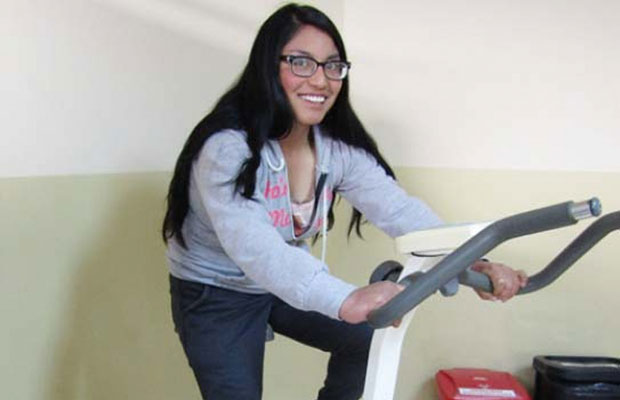
Critical Health Care Changes Lives
Young Nataly could have died from the tumor growing undetected in her left leg. Fortunately, her aunt’s foresight led this 17-year-old to a health clinic run by Salesian missionaries in Quito, Ecuador—and she now walks without pain, grateful for her second chance.
Born in Pesillo, a rural agricultural village in the northern Andes of Ecuador, Nataly had already faced many health-related adversities, even before she was born. Her mother had endured cancer while she was pregnant with Nataly, who—as a result—was born two months early with deformed feet. This led to significant developmental delays that prevented Nataly from walking until she was four years old.
Physical therapy and adequate health care could have helped Nataly tremendously in her early years, but these were never an option. At age two, following the death of her mother and abandonment by her father, she went to live with her desperately impoverished grandmother. Although Nataly grew up in a loving home, she did so without many of her basic needs being met—including regular preventive doctor’s visits. For fifteen years, she struggled to overcome physical limitations on her own. When walking and running became so painful that her aunt suspected something was seriously wrong, Nataly’s health—and future—changed course for the better.
After an X-ray at the Salesian clinic uncovered Nataly’s tumor, she successfully underwent surgery. Now 19 years old, she continues to receive ongoing care and physical therapy at the clinic and expresses her gratitude every day for the miracle of their generous and competent care. Her tumor cured, her pain gone, and her ability to walk and run just like her peers has made her feel “normal” for the first time in her life.
While Nataly’s story is uniquely her own, she is not the only child, or adult, to suffer the heartbreaking effects of inadequate health care. According to the World Health Organization, half of the world’s population lacks access to even the most basic and essential health care. That’s a staggering 3.5 billion people!
“The numbers are almost impossible to fathom,” says Fr. Mark Hyde, director of Salesian Missions. “And yet, we can’t let them deter us. Around the world, our ability to successfully help people pull themselves out of poverty depends upon their ability to get and stay healthy. This is why we strive to increase access to care—for low- to no-cost—whenever we identify a gap and have the resources to respond.”
Currently, Salesian missionaries operate more than 150 hospitals, clinics and dispensaries around the world, many in rural, hard-to-reach areas. Additional rapid-response teams, mobile health units, and temporary medical clinics bring much-needed medicine, vaccines, basic screenings and more to those who otherwise could not access or afford them.
Recently in Ghatkopar, India, for example—where a significant portion of the population dwells in the slums—the Don Bosco Development Society held a one-day health camp that offered basic physical exams, vision screenings, vitamins and medicine to 174 people, most of whom were women and children. In Hyderabad, where the Don Bosco Navajeevan Rehabilitation Center has already provided health services to more than 22,000 marginalized children, donors have funded the expansion of existing medical stations to accommodate an additional 800 girls and boys each year. Services include preventive check-ups, medicine, nutritional assistance, specialized care and hospitalization when necessary. Additionally, Salesian missionaries acquired a medical van that brings health care providers to the remote villages of Iloo Jargo in West Bengal to treat sick children and their families. When needed, the van serves as an ambulance to transport patients to the nearest hospital, over 100 miles away.
“Considering the scope of the global problem, we know these efforts represent just a small portion of the overall solution,” says Fr. Mark. “But the health care services we do provide make a tremendous difference in the lives of those, like Nataly, who receive it. This will remain one of our top priorities until every person in the world can access the care they need to achieve their full human potential.”
Our mission improves health, and lives, through increased access to low- and no-cost health care in impoverished communities around the world. What’s your mission?
Learn more about our work in Ecuador and in India.

